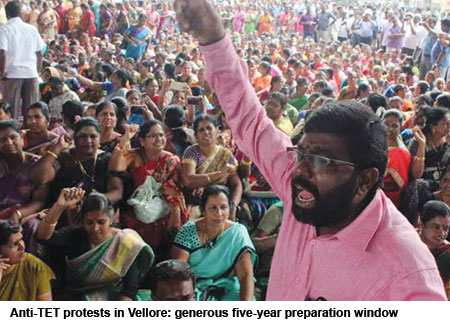 Over 1,500 school teachers of 8,403 government-aided schools in Tamil Nadu, who were on the verge of being sacked by the state government, have been given a last minute reprieve. Their transgression was that they had not passed the Teacher Eligibility Test (TET) mandated by s.23 (1) of the Right of Children to Free and Compulsory Education (RTE) Act, 2009, before March 31, the cut-off stipulated by the state government. On May 16, a vacation bench of the Madras high court issued an interim injunction restraining the state government from terminating their service. The vacation bench accepted the petitioners’ argument that the state government didn’t conduct a TET exam in 2018. The high court bench directed teachers who have not cleared this exam to write it on scheduled days June 8-9 and stayed the termination order until results of TET 2019 are declared.
Over 1,500 school teachers of 8,403 government-aided schools in Tamil Nadu, who were on the verge of being sacked by the state government, have been given a last minute reprieve. Their transgression was that they had not passed the Teacher Eligibility Test (TET) mandated by s.23 (1) of the Right of Children to Free and Compulsory Education (RTE) Act, 2009, before March 31, the cut-off stipulated by the state government. On May 16, a vacation bench of the Madras high court issued an interim injunction restraining the state government from terminating their service. The vacation bench accepted the petitioners’ argument that the state government didn’t conduct a TET exam in 2018. The high court bench directed teachers who have not cleared this exam to write it on scheduled days June 8-9 and stayed the termination order until results of TET 2019 are declared.
Right from the start, after the RTE Act, 2009 became law on April 1, 2010, Tamil Nadu’s elementary (class I-VIII) teachers have been hostile to TET which all teachers were obliged to pass within five years, i.e, 2015. On August 23, 2010 the Delhi-based National Council for Teacher Education (NCTE) decreed that passing TET with a minimum score of 60 percent is the basic qualification to teach in elementary schools countrywide. Previously pre-service diploma programmes D.El.Ed or D.T.Ed were sufficient qualification to teach classes I-V and a B.Ed was adequate for teaching classes VI-XII. Acknowledging that these qualifications were dispensed by haphazardly licensed teacher training institutions across the country, the RTE Act made clearing TET designed by NCERT mandatory for all government school teachers giving them a generous five-year window to prepare for it.
On November 15, 2011 when the Tamil Nadu government notified its Rules of the RTE Act, it stipulated that the state’s Teacher Recruitment Board would conduct TET annually for school teachers employed after August 23, 2010. However, the deadline for passing the test was extended from five to eight years, i.e, March 31, 2019. Immediately after the TET examinations were conducted in 2012 and 2013 and only a minuscule percentage of teachers passed it, a volley of writ petitions were filed in the high court. The last TET was conducted in 2017 and a whopping 95 percent of 753,000 teachers who wrote it statewide, failed. “Most government-aided school teachers who are yet to clear TET are well qualified for their jobs. Their capability should not be judged by marks scored in the TET but by how well they teach children,” argues N. Rangarajan, secretary, Tamil Nadu Elementary School Teachers’ Federation.
Unsurprisingly, objective monitors of Tamil Nadu’s crumbling education system, bedevilled by nepotism, corruption and ill-considered interventions by the state’s populist politicians, blame the pathetic condition of Tamil Nadu’s 732 B.Ed degree colleges and 110 diploma colleges which casually award diplomas in teacher education. “The B.Ed and D.Ed syllabuses are completely obsolete and don’t equip students with any subject knowledge. Before completion of their two-year degree and diploma programmes teachers are deputed to teach for three months without any training in new pedagogies and use of digital technologies. Therefore, TET with a generous window for in-service teachers to study further, was introduced to improve learning outcomes in government schools. It’s a commendable initiative to improve the subject knowledge and motivate teachers to improve their teaching skills,” says Dr. K.R. Maalathi, teacher trainer and founder-CEO of the Chennai-based Auuro Educational Services.
In 2012, the Justice Verma Commission appointed by the Supreme Court to examine the quality of education dispensed by teacher training colleges countrywide was moved to heavily criticise “the poor quality of pre-service education programmes and poor subject knowledge of candidates reflecting the poor quality of general education”. “It could be argued that the need for conducting TET may not have arisen if a fairly rigorous system of making admission to teacher education courses had been followed,” said the commission’s report.
The rock-bottom and worsening learning outcomes of children in Tamil Nadu’s 32,648 rural government schools routinely reported by the Annual Status of Education Report (ASER) of the Pratham Education Foundation are intimately connected with the pathetic quality of teachers certified by the country’s 15,000 recklessly licensed teacher training institutions. Asking under-qualified teachers to improve their teaching skills to right this wrong, which is severely hurting hapless school children, is not at all a tall order.
Hemalatha Raghupathi (Chennai)























